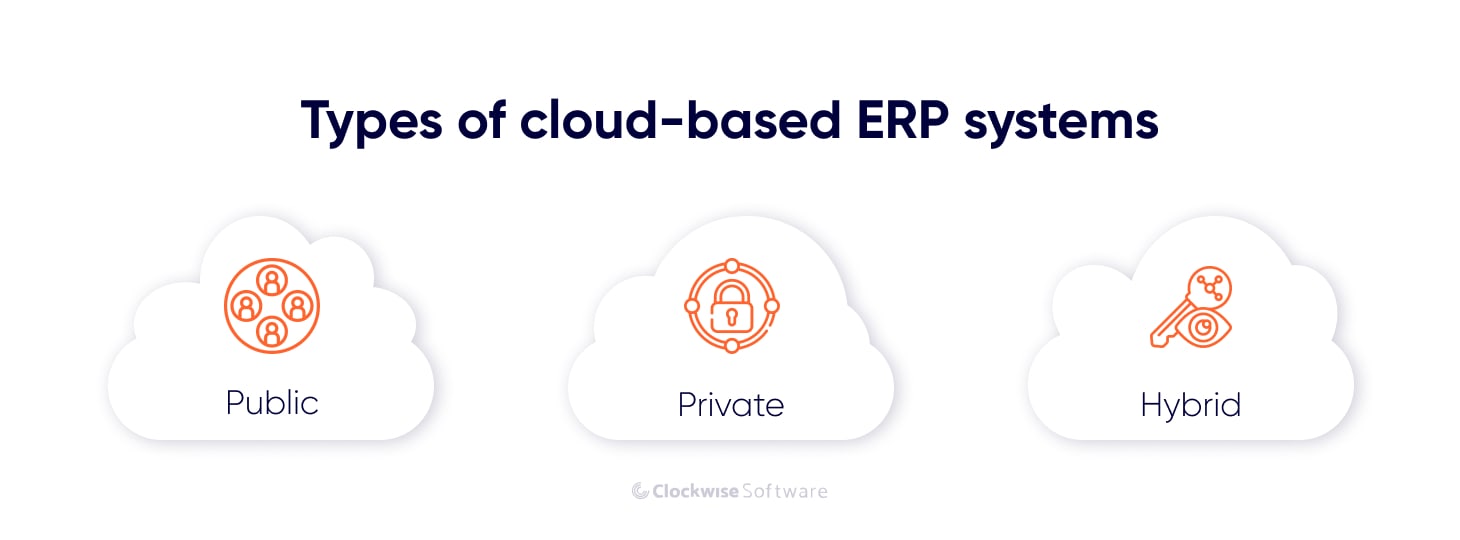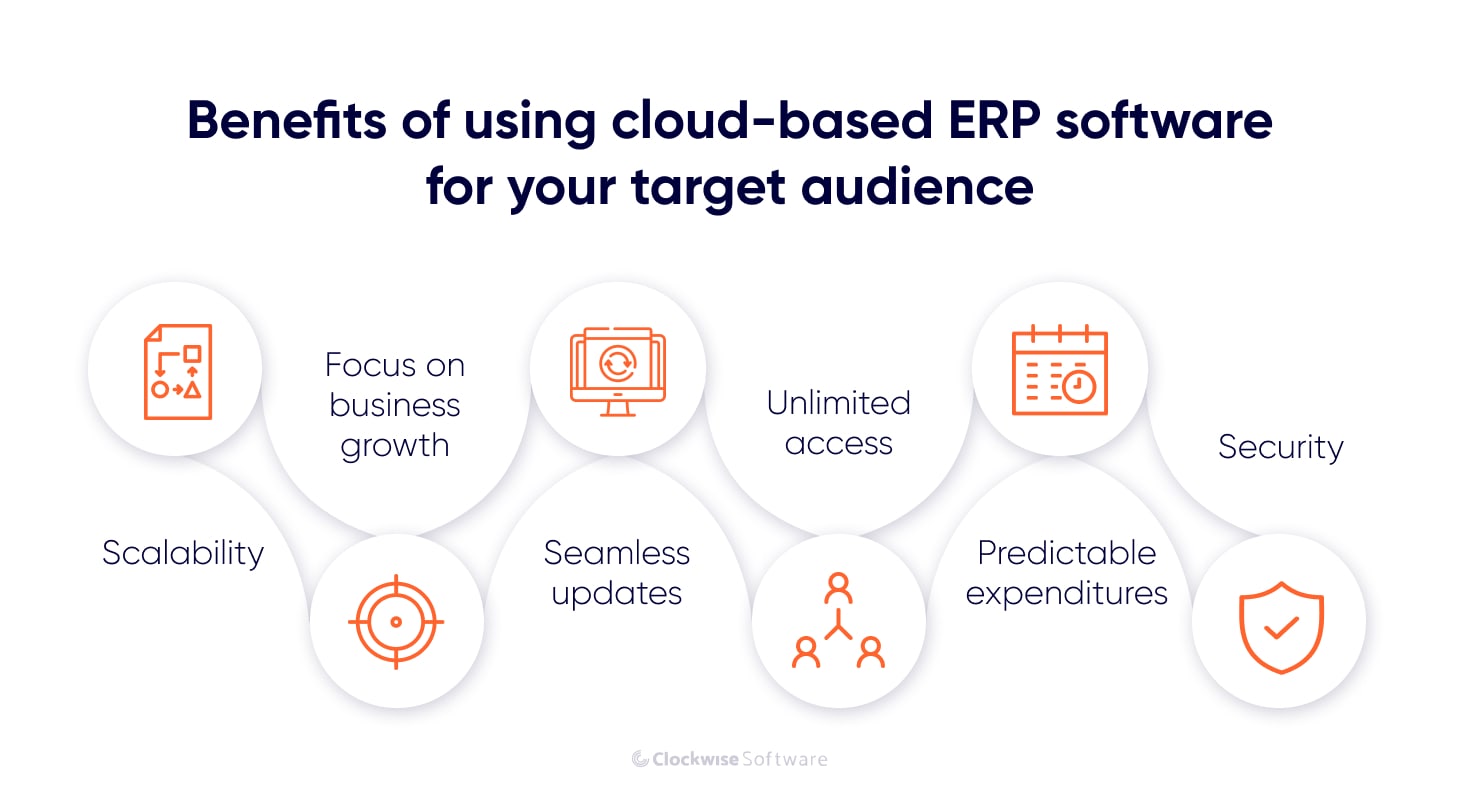- There are two main types of ERP software: cloud and on-premise or traditional. Analyzing the benefits and drawbacks of cloud-based versus traditional ERP systems can help businesses decide which type fits them best.
- Cloud-based ERPs are growing in demand due to the increasing popularity of cloud technologies and the SaaS model.
- Among the main future trends in cloud ERP software are artificial intelligence and machine learning implementation, headless architecture, and integration with the Internet of Things.
Cloud services, including cloud-based ERP software, are becoming more and more popular for managing business functions. With a great number of benefits, cloud services are taking the lead and superseding traditional ERP software.
If you’re a young startup thinking about bringing your own cloud-based ERP system to the market, this article will help you understand the current SaaS and cloud ERP trends and show how your cloud ERP software can benefit existing businesses. In particular, you’ll find out:
- what is cloud-based ERP, and how it differs from on-premises systems
- the principles of a cloud-based ERP system’s operation
- the reasons for ERP software’s popularity
- what value your cloud-based ERP can bring to existing businesses
Let’s start with the basics.
Types of ERP software
Enterprise resource planning (ERP) software brings together different tools to allow users to keep track of business processes. An ERP platform includes a number of tools for accounting; supply, order, and inventory management; human resource management; customer relationship management; and even project management. With such a wide variety of tools inside one piece of software, daily business operations become effortless. For example, ERP software for real estate can automate routine tasks, such as booking, property, and supply chain management, implement visitor control, and enhance cyber security.
ERP software can be hosted on-premises or in the cloud. Let’s consider the particularities and differences of on-premises and cloud-based ERP systems.
| On-premises ERP system | Cloud-based ERP system | |
| Hosting | In-house servers | Cloud services |
| Best choice for | Businesses that want to have customized software to meet their specific needs and have full control over their processes | Businesses that want to organize straightforward processes and conveniently manage business data |
| Requirements for use | In-house IT staff, investment in maintenance and security | Need to migrate the system and train employees to use it; no maintenance or security concerns |
On-premises ERP system
On-premises ERP software is installed on a company’s servers and is maintained by an in-house team of developers and system administrators. To use such a system successfully, business owners need to invest in hardware, the ERP software itself, experienced IT staff, security software, and system maintenance.
Cloud-based ERP system
Unlike on-premises software, cloud-based ERP software is hosted in the cloud. Cloud technology services operate in the following way: Information is stored on remote servers that users can access via the Internet. These servers are located on numerous interconnected computers, allowing cloud-based apps to provide fast response times even if some of the computers fail to operate properly.
Cloud applications are hosted by a hosting company. Today, businesses can choose from the big three Azure, AWS, or Google Cloud or try more niche providers.
By opting for cloud ERP software, business owners avoid the hassle of running an on-premises platform since maintaining the system is the cloud ERP software vendor’s responsibility. Depending on the deployment option, there are three types of cloud-based ERPs: public, private, and hybrid.

A public cloud is an IT model that implies providing and sharing computing services over the public internet. ERP software can be hosted in a public cloud as a Software as a Service (SaaS) solution, and this is the type of solution you’ll want to build. The SaaS business model allows companies to migrate to the cloud quite fast since all hardware and software are provided. Despite the name “public,” all the data a company keeps inside an ERP software solution hosted in a public cloud is available only to those to whom the company grants access.
A private cloud means that a business has its own separate cloud infrastructure. When building your cloud-based ERP, you should keep in mind that some of your clients might want to use a private cloud and include it in the custom software development cost. You can offer a private cloud as an upgrade option. This will help your users have peace of mind about their data security while giving you an opportunity to sell a more expensive service.
Hybrid ERP software is a mixture of on-premises and cloud solutions. This is for companies that can’t choose between cloud-based ERP vs traditional ERP battle and store sensitive user data and need to pay extra attention to security. By opting for a hybrid ERP, business owners can have their main software on-premises while using private or public servers and databases.
How does a cloud-based ERP system work?
Cloud-based ERP software is usually presented as a SaaS solution. With a SaaS product, you can allow users to take advantage of different functionality by choosing a suitable subscription plan: the more expensive the plan, the more functionality they’ll be able to use. Thus, by building a SaaS-based cloud ERP system, you’ll be able to meet the needs of small, midsize, and large businesses. You can learn more about SaaS architecture by reading our article.
As a rule, cloud ERPs offer different monthly or annual plans depending on the number of users. You can also allow users to try out your cloud ERP software’s functionality by offering a free trial.
Why is cloud ERP software in demand?
No matter the size and type of a business, it needs enterprise resource planning software to run its operations effectively. At the very beginning of business operations, business owners might opt for Excel tables and Google Sheets to keep track of all their processes. But sooner or later, the business requirements exceed the spreadsheet’s functionality. Now is the time to target businesses that are encountering the limitations of their existing tools and offer them your cloud-based ERP for convenient business management. When should you offer businesses your cloud-based ERP?
The business is growing
The bigger a company becomes, the more data and processes it has to manage. A cloud-based ERP system for a small business with rapid growth will help it scale without a hassle. By taking care of your cloud ERP’s performance and scalability, you allow your customers to increase their server capacity in several clicks.
The business spends too much on software
Your target users may not have a unified data management solution yet, and they probably purchase different software products to solve different tasks. By offering them cloud ERP solutions, you provide them with a universal system that brings all their processes under one roof. In addition to having all the necessary functionality to meet their business needs, they’ll be able to predict their expenses. Just make sure you provide information about your subscription plans.
The business has inefficient processes
No matter its size, a company might have trouble organizing processes.
A new business might not have tried any enterprise resource planning system before. Business owners might have handled all information with the help of spreadsheets, task trackers, accounting systems, a custom CRM system, etc. Storing and processing information in different systems can lead to the inability to unify that information, inefficient data management, irrelevant reporting, and a lack of data-driven decisions. A decent cloud-based ERP implementation can help your users solve these pain points.
As your user’s business grows, the challenges of effective process management grow, too. That’s why midsize and large businesses will likely find it more difficult to adopt a cloud-based enterprise resource planning than small businesses will. Owners of large businesses will have to spend a lot of time, money, and resources to migrate all their data to cloud ERP software. Thus, the sooner a company starts using a cloud-based ERP, the fewer organizational troubles they’ll face when the company grows.
While migrating to a cloud-based ERP system is a sensible decision for many businesses, some hesitate as to whether they should choose such software for their purposes. There are a couple of situations when your cloud ERP might be challenging for businesses to adopt.
The business stores sensitive information
Storing users’ data requires companies to pay extra attention to data integrity during the custom software development process and after launch, so you have to make sure you’ll be able to provide data security in the cloud for your users. Make sure your cloud-based ERP solutions comply with data security laws, regulations, and standards of whatever industry or industries you’re targeting. For example, to store healthcare clients’ data, your software should be HIPAA compliant. Any software that stores and processes users’ financial data should comply with the PCI DSS standard. For any solution that gathers users’ personal data and provides services to EU residents, GDPR compliance is a must.
The business uses an on-premises ERP platform
Migrating from an on-premises system to a cloud ERP solution can take some time and effort, and the larger the organization, the more complicated the process. This can stop your target users from making a firm decision to migrate. But you can convince them that your cloud ERP is the most reasonable solution in terms of price and quality.
If, despite all the possible challenges, you decide to build a cloud-based ERP solution, you’ll have a chance to bring a number of advantages to your users.
Cloud-based ERP benefits
Business owners wouldn’t opt for cloud ERP software if it didn’t have clear benefits. Let’s see what advantages you can offer to your clients with an ERP platform hosted in the cloud.

Scalability
Sooner or later, your target users’ business will start growing. Scaling on-premises software will allow business owners to purchase more hardware and software as well as involve more people in its maintenance. However, you can offer a better option. Cloud ERP software can easily scale. Persuade your users that they can seamlessly scale whenever they need to, and they will have a good reason to opt for your software.
Focus on business growth
Taking into account that your users don’t need to put much effort into running a cloud-based ERP system, they can focus on more strategic goals. For example, they can direct the money they save to hire more team members and grow their business.
Seamless updates
By choosing your cloud-based ERP solution, your customers will take advantage of regular updates that don't affect their workflow and bring more value at the same time. Since it's your responsibility to work on your platform improvements to provide your customers with a better experience, they can forget about the hassle of staying up-to-date (as they would do with on-premises software). For your customers, automatic updates also mean no maintenance efforts.
Unlimited access
By storing all information in the cloud, a cloud ERP system allows users to access it from any device at any time. To use a cloud-based solution, a user only needs internet access and a browser on a PC, tablet, or smartphone.
Predictable expenditures
Show your target users your subscription plans so they can allocate their budgets wisely. It’s easy to calculate how much you’ll need to spend if you know the monthly or annual subscription fees.
Security
Make sure you take good care of your cloud ERP software’s security. This is one of the most important concerns your target users can have as they entrust you with their essential business data. Work on providing your users with regular backups of their data so they have peace of mind concerning their data security. And don’t forget about compliance.
Future of cloud ERP software
Cloud computing platforms definitely revolutionized enterprise resource planning software. Today, many of the fastest growing SaaS companies are cloud-based ERP vendors. To build your own successful solution, it is not enough to know about SaaS trends. Let’s talk about the future of cloud ERP software.
Artificial intelligence (AI) and machine learning (ML)
AI and ML implementation into modern ERP solutions will make them even more powerful tools for business management. Integration of these cutting-edge technologies enables ERP systems to provide advanced analytics, predict market trends, automate even more tasks, and improve decision-making processes.
Headless ERP
The headless architecture separates the front-end user interface from the back-end stack and data storage. This approach improves the performance, security, scalability, and customization of ERP software. The most important among the benefits of cloud ERP with headless architecture is seamless integration with other systems via APIs. To learn more about how to build such a system, read our white paper on SaaS architecture design.
Emphasis on security
Security concerns have long been one of the main disadvantages of cloud-based ERP systems. But today, cloud ERP vendors implement advanced security measures during the SaaS product development cycle, such as regular vulnerability assessments and multi-factor authentication. Growing emphasis on security in the best cloud-based ERP solutions will attract even more users in the future.
The Internet of Things (IoT) and ERP software
Today, IoT devices and sensors are seamlessly integrating with ERP systems. They can provide accurate real-time data for more accurate decision-making and improvements. IoT is especially useful for cloud-based ERP for manufacturing, but it also quickly finds its way into other industries.
Conclusion
With the growing demand for cloud services, building a cloud ERP system seems like a reasonable choice for a young startup. Moreover, with the number of advantages of cloud based ERP for businesses, you have a good chance of addressing your target users’ pain points and offering the best solution.



